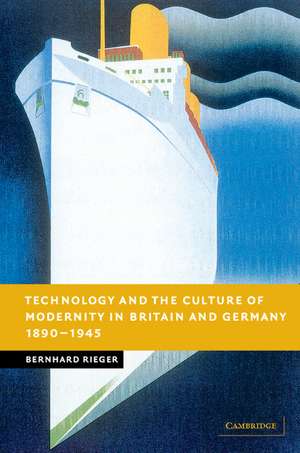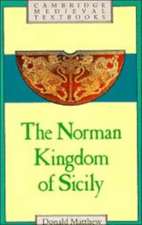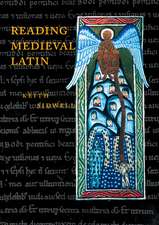Technology and the Culture of Modernity in Britain and Germany, 1890–1945: New Studies in European History
Autor Bernhard Riegeren Limba Engleză Paperback – 7 ian 2009
| Toate formatele și edițiile | Preț | Express |
|---|---|---|
| Paperback (1) | 339.37 lei 6-8 săpt. | |
| Cambridge University Press – 7 ian 2009 | 339.37 lei 6-8 săpt. | |
| Hardback (1) | 689.05 lei 6-8 săpt. | |
| Cambridge University Press – 15 feb 2005 | 689.05 lei 6-8 săpt. |
Din seria New Studies in European History
-
 Preț: 177.91 lei
Preț: 177.91 lei -
 Preț: 238.02 lei
Preț: 238.02 lei -
 Preț: 208.50 lei
Preț: 208.50 lei -
 Preț: 398.42 lei
Preț: 398.42 lei -
 Preț: 237.92 lei
Preț: 237.92 lei - 9%
 Preț: 593.91 lei
Preț: 593.91 lei -
 Preț: 180.06 lei
Preț: 180.06 lei - 9%
 Preț: 592.61 lei
Preț: 592.61 lei -
 Preț: 169.70 lei
Preț: 169.70 lei -
 Preț: 211.13 lei
Preț: 211.13 lei -
 Preț: 166.99 lei
Preț: 166.99 lei -
 Preț: 266.53 lei
Preț: 266.53 lei -
 Preț: 241.90 lei
Preț: 241.90 lei -
 Preț: 429.99 lei
Preț: 429.99 lei -
 Preț: 400.05 lei
Preț: 400.05 lei - 11%
 Preț: 698.50 lei
Preț: 698.50 lei -
 Preț: 275.85 lei
Preț: 275.85 lei -
 Preț: 330.09 lei
Preț: 330.09 lei - 11%
 Preț: 695.93 lei
Preț: 695.93 lei -
 Preț: 423.10 lei
Preț: 423.10 lei -
 Preț: 340.13 lei
Preț: 340.13 lei - 11%
 Preț: 698.30 lei
Preț: 698.30 lei -
 Preț: 326.82 lei
Preț: 326.82 lei -
 Preț: 396.59 lei
Preț: 396.59 lei -
 Preț: 383.48 lei
Preț: 383.48 lei -
 Preț: 292.40 lei
Preț: 292.40 lei - 14%
 Preț: 682.94 lei
Preț: 682.94 lei -
 Preț: 282.75 lei
Preț: 282.75 lei -
 Preț: 417.07 lei
Preț: 417.07 lei -
 Preț: 437.18 lei
Preț: 437.18 lei - 14%
 Preț: 873.67 lei
Preț: 873.67 lei -
 Preț: 420.40 lei
Preț: 420.40 lei -
 Preț: 319.99 lei
Preț: 319.99 lei - 14%
 Preț: 687.39 lei
Preț: 687.39 lei -
 Preț: 397.01 lei
Preț: 397.01 lei - 11%
 Preț: 695.93 lei
Preț: 695.93 lei - 11%
 Preț: 543.84 lei
Preț: 543.84 lei
Preț: 339.37 lei
Nou
64.94€ • 69.44$ • 54.14£
Carte tipărită la comandă
Livrare economică 17 aprilie-01 mai
Specificații
ISBN-10: 0521093147
Pagini: 332
Ilustrații: 10 b/w illus.
Dimensiuni: 152 x 229 x 19 mm
Greutate: 0.49 kg
Editura: Cambridge University Press
Colecția Cambridge University Press
Seria New Studies in European History
Locul publicării:Cambridge, United Kingdom
Cuprins
Recenzii
Review of the hardback: ' …a far-reaching and penetrating account of how the 'culture of modernity' forever remade Britain and Germany … well written and clearly argued.' Paul Betts, Journal of Modern History
Review of the hardback: ' … an original and welcome contribution … [Rieger] exercises his knack for inspired choices. Rieger's unique contribution is to identify the dynamic link between pessimism and optimism in all visions of modernity … an impressive engagement of scholarship.' Michael Thad Allen, Business History Review
Review of the hardback: ' … a conceptually ambitious and substantively wide-ranging study … a fascinating, important, and provocative work that should be read by all those interested in how societies understand and promote technology.' Mary Nolan, Central European History
From the hardback review: ' … very convincing … this bright book is also well written and tells a plethora of thrilling stories.' Ulrich Wengenroth, Historische Zeitschrift
Descriere
This book examines the obsession for new technology that swept through Britain and Germany between 1890 and 1945. Drawing on a wide range of popular contemporary writings and pictorial material, it explains how, despite frequently feeling overwhelmed by innovations, Germans and Britons nurtured a long-lasting fascination for aviation, glamorous passenger liners and film as they lived through profound social transformations and two vicious wars. Public discussions about these 'modern wonders' were torn between fears of novel risks and cultural decay on the one hand, and passionate support generated by nationalism and social fantasies on the other.
While the investigation focuses on tensions between technophobia and euphoria, the book also examines the relationship between responses to technology and the differing political cultures in Britain and Germany before and after 1933. This innovative study will prove invaluable reading to anyone interested in comparative cultural history as well as the history of technology.






























